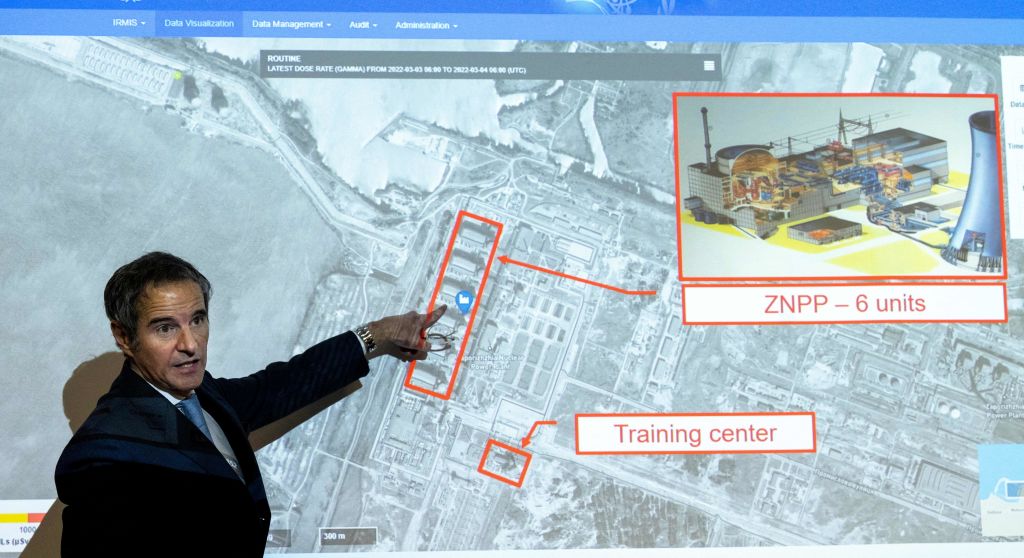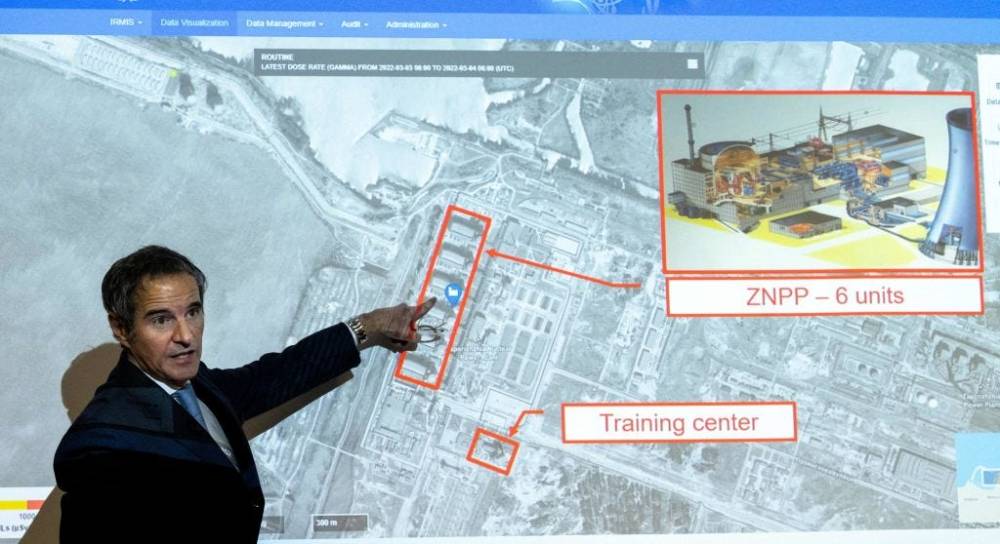Happy Friday! It’s NFL draft season, which means it’s time for a bunch of old men to go on TV and talk about the size of a 23-year-old kid’s hands.
Quick Hits: Today’s Top Stories
The second round of ceasefire negotiations between Russia and Ukraine came and went Thursday without a resolution to the broader conflict, but the two sides claimed they agreed to establish “humanitarian corridors” and “possible temporary ceasefires” to allow Ukrainian civilians to evacuate “military clash zones.” A senior U.S. defense official told reporters Thursday Russian ground forces remain “largely stalled” in northern Ukraine while the bombardment of Kyiv, Chernihiv, and Kharkiv persists. The official acknowledged reports that Russian forces had captured the southern city of Kherson, but could not independently verify them. Ukrainian air and missile defense systems remain operational, and Ukrainian forces reportedly killed Maj. Gen. Andrey Sukhovetsky, the commanding general of the Russian 7th Airborne Division.
German officials confirmed Thursday Germany will add 2,700 Soviet-made surface-to-air rockets to its arms shipment to Ukraine. It had already approved sending 1,000 anti-tank missiles and 500 Stingers earlier this week.
The Biden administration announced another tranche of sanctions on Thursday, targeting Kremlin spokesman Dmitry Peskov, dozens of additional Russian oligarchs and their families, and dozens of entities and individuals who have played “central roles” in the Kremlin’s efforts to “spread disinformation and influence perceptions as a part of their invasion of Ukraine.”
Arizona Gov. Doug Ducey informed donors yesterday he will not run for the Senate this year, dashing the hopes of Republican leaders who saw him as the strongest candidate to challenge Democratic Sen. Mark Kelly. Democratic Sen. Ben Ray Luján of New Mexico returned to the Senate on Thursday one month after he suffered a cerebellar stroke that left him hospitalized for weeks.
In response to Putin’s invasion of Ukraine, U.S.-based aluminum producer Alcoa announced Wednesday it would stop buying raw materials from and selling to Russian businesses. The London Stock Exchange suspended trading in 27 Russian-linked companies, and the International Paralympic Committee announced Thursday it is banning Russian and Belarusian athletes from competing in the 2022 games, which begin today. The IPC had said earlier this week the athletes could compete under a neutral flag, but reversed course after several countries threatened a boycott.
After French President Emmanuel Macron spoke with Russian President Vladimir Putin on Thursday, a French government official told reporters they believe “Russian ambitions are to take control of all of Ukraine,” adding there is “nothing in what President Putin said that should reassure us.”
Homeland Security Secretary Alejandro Mayorkas announced Thursday the Biden administration will grant Temporary Protected Status to Ukrainians currently in the United States illegally or on non-immigrant visas. The move will shield approximately 30,000 people from deportation for 18 months and offer them work permits.
Omicron continues to wane in the United States, with the average number of daily confirmed COVID-19 cases falling 56 percent over the past two weeks. Daily COVID-19 deaths—a lagging statistical indicator throughout the pandemic—have decreased about 36 percent over the same time period.
The Labor Department reported Thursday that initial jobless claims decreased by 18,000 week-over-week to 215,000 last week.
Reports of Attack on Nuclear Plant Spark Anxiety

If you’re signed up to receive news alerts on your phone, odds are you got a pretty scary one around 8 p.m. ET last night: “Europe’s largest nuclear power plant on fire as Russians shell Ukrainian facility.” Andriy Tuz, a spokesman for the Zaporizhzhia plant, told Ukrainian TV that the shells were hitting the facility directly and that one of its six reactors—one that was not operating, but still had fuel inside—had caught fire.
Ukraine? Nuclear power plant? Fire? Your mind probably jumped somewhere very specific, the same place Ukrainian Foreign Minister Dmytro Kuleba’s mind did: “If it blows up, it will be 10 times larger than Chernobyl!” In a video published around 4:30 a.m. local time, Ukrainian President Volodymyr Zelensky warned an explosion would be “the end for everyone. The end for Europe.”
Within an hour or two, however, it became clear the nuclear threat was never that high. What had caught fire in the live-streamed videos of the fighting was a training building near the plant, not the plant itself—and certainly not an actual reactor, which are each surrounded by nearly impenetrable containment domes. The International Atomic Energy Agency (IAEA) announced no “essential” equipment had been affected, and its regulator in Ukraine reported no change in radiation levels. U.S. Energy Secretary Jennifer Granholm agreed with that assessment after activating the Department’s Nuclear Incident Response Team, and said the reactors were “protected by robust containment structures” and in the process of being “safely shut down.”
But the incident—occurring early on the ninth day of hot war between Russia and Ukraine—understandably sparked an international frenzy. President Joe Biden spoke with Zelensky late last night to get an update on the situation, as did British Prime Minister Boris Johnson and German Chancellor Olaf Scholz. If Russian President Vladimir Putin is unhinged enough to order an attack on the largest nuclear power plant in Europe—one that’s just a few hours’ drive from Crimea or the “Donetsk People’s Republic” he ostensibly believes to be full of Russians—maybe the West needs to stop treating him as a rational actor, because such a bombardment makes no sense from a strategic standpoint.
Unless, of course, Putin is operating under the “madman theory”—as he may have been earlier this week when putting Russia’s own nuclear forces on “special alert”—and wants his adversaries to believe he’s unhinged enough to blow up a nuclear power plant. Though the White House has consistently opposed the idea, some American lawmakers renewed their calls to establish a no-fly zone over Ukraine in response to the news.
In actuality, the move—which follows Russian forces taking control of the aforementioned Chernobyl nuclear plant and attacking thermal power plants in the Sumy oblast and elsewhere—likely had more to do with constricting Ukrainian energy supply. The Zaporizhzhia plant, in the southeastern city of Enerhodar, accounts for nearly half of Ukraine’s nuclear power—and about 20 percent of its electricity production overall.
Indeed, one of the first things Russian forces appear to be doing after taking over the plant is ordering staff to shut things down. The first reactor was out of commission, the second and third have been disconnected from the grid and begun to cool down, the fourth is operating at reduced capacity, and the fifth and sixth are being cooled down. “The personnel continue working at their workplaces,” Ukraine’s State Nuclear Regulatory Inspectorate said Friday morning. “Operational personnel monitor the state of power units and ensure their operation in accordance with the requirements of the process procedures for safe operation.”
There’s always a risk something goes terribly wrong when you’re literally lobbing bombs at a nuclear power plant, and Russia’s reason for doing so—putting the energy squeeze on the population it is seeking to conquer—is morally grotesque. But the Zaporizhzhia plant is far safer than Chernobyl ever was—it houses pressurized water reactors that have containment systems Chernobyl’s reactors didn’t—and even a worst case scenario would be nowhere near “10 times larger than Chernobyl.”
“The reactor is a shiny metal vessel, deep inside a very strong and robust, thick, concrete dome and building,” Mark Nelson—managing director of the nuclear-focused Radiant Energy Fund—told reporters last night, noting the domes are designed to withstand an airplane crashing into them at full speed. “This is not a good event; a power plant that should not be a military objective is being fired upon. … [But] the safety of the public from radiation is not something that’s at risk at the moment. And we would know over a long period of time, if damage or activity were taking place that would compromise the ability of the emergency cooling systems to continue operating.”
The biggest danger here is not an explosion, but power at the plant being knocked out and affecting the reactors’ cooling systems. “There’s a series of events that would have to occur before we get to any kind of fallout or dose [of radiation] to the public,” said Josh Payne, a nuclear reactor design analyst. “If we go with the offsite power loss chain of events, we lose offsite power, we switch over to generators. Say for some reason the generators go out, suddenly we’ve lost the pumps, so we’ve lost circulating capacity for that water. Now the decay heat has to go into that water. … The decay heat will build up, and over time you will have enough heat inside the system where you will have to vent some amount of steam.”
“Worst case scenario is probably going to be they are venting some primary coolant that was steam,” he continued, “and people in the surrounding area get about the equivalent of a chest X-ray. That was what happened at Three-Mile Island. The core melts, it’s a big loss for the power plant, it sucks financially, but doesn’t really hurt anybody.”
Is Ukraine EU-Bound?
Have Vladimir Putin’s devastating and violent efforts to reverse Ukraine’s Westward drift have, predictably, driven Ukraine further into the arms of the West? When Ukrainian President Volodymyr Zelensky made an emotional plea to the European Union earlier this week asking for immediate accession into the bloc, EU officials were incredibly receptive.
“Ukraine and its people are family,” European Council President Charles Michel tweeted Saturday. “Further concrete support is on its way.” Ukraine is “one of us,” European Commission President Ursula von der Leyen told Euronews Sunday, “and we want them in the European Union.”
But the process is not that simple. In a piece for the site, Andrew walks readers through what Ukraine would have to do to gain admittance, and explains why it could be years before any concrete action is taken.
“Immediate accession” is almost assuredly off the table.
Joining the European Union is no small thing; it requires unanimous approval from the 27 current member states. Countries must also meet criteria that assess their functioning as democracies with stable governing institutions and a free-market economy—criteria it is hard to argue any state currently engaged in a war for survival could meet.
Most notably, countries must also put all binding EU rules and regulations on their own government books—a process that usually takes many years. Poland, for instance, applied for membership in April 1994 and was confirmed by EU member states that December—but did not finally accede to the Union until 2004.
Some experts caution that it would be a mistake for Europe to decide such things in a burst of wartime enthusiasm—particularly since European solidarity for the plight of Ukraine might ebb if the conflict slows and grows cold and domestic pain from Russian sanctions grows clearer.
“My fear is that this solidarity could prove temporary,” Pawel Zerka, a policy fellow and expert on the EU and Poland at the European Council on Foreign Relations, told The Dispatch. “It is clear that you are solidary with Ukrainians when you see war just beyond your borders, war in which there is one clear offender and one society which is defending itself, and the offender, the aggressor, is behaving in a way where women and children are casualties. So it’s easy to be solidary with Ukraine right now; it’s even easy to open up Europe to refugees from Ukraine.”
“But imagine that this conflict lasts longer,” he went on. “There will be economic effects of that war, because sanctions on Russia means that many businesses in Europe can no longer trade with Russia. There is a risk that energy prices will increase even farther, especially if Russia decides to stop or limit its supplies of energy on which Europeans are still often pretty dependent.”
As the shock of war recedes, it’s possible that preexisting structural obstacles to Ukrainian accession will loom larger as well. Ukraine is a large nation—of the EU countries, only Germany, France, Italy, and Spain are more populous—meaning it would instantly become a major player in EU parliamentary affairs upon admittance. It is also quite poor, which means it would be eligible for development spending from the EU’s Cohesion Fund should it be admitted.
But it does seem likely that—barring a total Russian victory in Ukraine leading to regime change in Kyiv—Russia’s assault has both made eventual EU membership for Zelensky’s government both more likely and sped up its timetable.
Putin may have been wrong to discount the EU. It’s no NATO, but the EU’s governing treaty does contain a suggestion of an obligation of mutual defense: “If a Member State is the victim of armed aggression on its territory, the other Member States shall have towards it an obligation of aid and assistance by all the means in their power.”
Experts caution that this clause is vague and has never been tested in practice—in fact, it even contains a carveout to absolve historically neutral countries like Sweden from any suggestion of obligation of military support (the provision, it says, “shall not prejudice the specific character of the security and defence policy of certain Member States”). But we’ve seen this week that a united Europe can do plenty of damage, and offer plenty of help, even if the aid and assistance offered is economic in nature.
Worth Your Time
According to Russian journalist Alexey Kovalev, many Russians have followed the story of their country’s incursion into Ukraine with a sense of shock and shame. “It’s hard to find a Russian family without Ukrainian relatives and friends, husbands and wives, girlfriends and boyfriends, chess partners and colleagues. Many of them are now hiding in bomb shelters in Kyiv and Kharkiv,” he writes in a piece for The New York Times. “Whatever military ‘victory’ Mr. Putin might find acceptable in his twisted mind, Russia has already suffered a crushing moral defeat. And to a certain extent, it seems like the Russian people know it. Though dissent has been effectively outlawed, thousands of people have taken the risk to express their opposition to the invasion. And it’s not just the usual suspects, the malcontents already known to the Kremlin. Major public figures, prominent journalists and artists have spoken out against the war. We may be far from a large-scale antiwar movement, but the seeds have been sown. And once they flower into outright defiance, it could spell trouble for Mr. Putin.”
In a piece for National Review, Dan McLaughlin cheers the Ukrainian government’s use of propaganda—or “spin, narrative, framing”—to outfox Vladimir Putin. “Even when deployed in the most just and pure causes, wartime propaganda is inevitably emotionally manipulative, oversimplified, and frequently misleading. It is also essential to the success of a just cause—not only in rallying a nation to fight but also when the combatants are appealing to outsiders for help,” he writes. “Ukraine has, thus far, conducted a master class in propaganda, and as a wholehearted supporter of the Ukrainian cause in this war, I applaud it. That said … we should recognize that some of what we are being fed is propaganda, and we should consume it accordingly, knowing that many of the stories we are hearing of plucky Ukrainian resistance and Russian brutality and ineptness are, in at least some of their details, false or exaggerated.” Ukrainian President Volodymyr Zelensky, he adds, has risen to the occasion. “He has used his background as a TV entertainer to grasp his country’s propaganda needs both for internal and external audiences.”
In a piece for Bloomberg, Hal Brands argues the past week should remind policymakers the importance of maintaining America’s nuclear arsenal. “Extended nuclear deterrence—the threat that the U.S. might use nuclear weapons rather than see its allies defeated in conventional wars—has long underpinned America’s alliance network,” he writes. “Shifting to a no-first-use or sole-purpose doctrine might have been feasible a generation ago, when Russia’s military was pathetic, and it was commonly joked that the Chinese army would need a ‘million-man swim’ to reach Taiwan. It is far riskier at a time when the U.S. is struggling to shore up the military balance in Eastern Europe and the Western Pacific, and when conflict in one of those theaters would make it nearly impossible for Washington to defend, with conventional forces, its allies in the other. … The central paradox of the nuclear era is that tools of unimaginable destruction contributed to an age of unprecedented human flourishing and creation. Nuclear weapons will be no less central to the struggle over world order that is unfolding today.”
Presented Without Comment
Also Presented Without Comment
Toeing the Company Line
The wait is over! The Dispatch’s newest contributor, Klon Kitchen, sent out the first edition of his tech/national security newsletter on Thursday. Click through to find out why he named it The Current, learn a little more about where he’s coming from, and get up to speed on some of the cyber terminology he’ll be using going forward.
In this week’s Stirewaltisms (🔒), Chris looks at the politics of Russia’s invasion of Ukraine for President Biden and former President Donald Trump. “President Joe Biden should expect some increase in support as Americans show bipartisan unity in support of the Ukrainian struggle,” he writes. “It’s been many years since we’ve seen this kind of consensus on a major issue, and traditional political rules hold that such unity should be to the benefit of the president. But Biden is attempting to use that goodwill to try to restart his stalled domestic agenda. This looks like a pretty obvious mistake.”
On Thursday’s episode of Advisory Opinions, David and Sarah start with a Supreme Court update on adoption and religious freedom cases before turning to the January 6 Committee’s latest filing that contests John Eastman’s claims of attorney-client privilege. Plus: Ukraine, the European Union, and international law.
Let Us Know
From inflated casualty counts, to heroic anecdotes that turn out to be untrue or exaggerated, to today’s initial comments about the nuclear plant, it’s become increasingly clear the Ukrainian government is countering Putin’s information warfare with some information warfare of their own—and it’s working.
Does that bother you at all, or do you agree with Dan McLaughlin that wartime propaganda is “essential to the success of a just cause?”
Reporting by Declan Garvey (@declanpgarvey), Andrew Egger (@EggerDC), Charlotte Lawson (@lawsonreports), and Steve Hayes (@stephenfhayes).







Please note that we at The Dispatch hold ourselves, our work, and our commenters to a higher standard than other places on the internet. We welcome comments that foster genuine debate or discussion—including comments critical of us or our work—but responses that include ad hominem attacks on fellow Dispatch members or are intended to stoke fear and anger may be moderated.
With your membership, you only have the ability to comment on The Morning Dispatch articles. Consider upgrading to join the conversation everywhere.